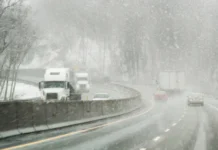 ICBC is urging drivers to be prepared this long weekend for seasonal changes that could create adverse road conditions.
ICBC is urging drivers to be prepared this long weekend for seasonal changes that could create adverse road conditions.
B.C. sees about 2,000 crashes every Thanksgiving long weekend that, on average, result in 600 injuries and four fatalities.
ICBC offers the following tips for drivers:
-
Plan your route ahead of time. The weather can be unpredictable on highways and at higher elevations; plan ahead to make your trip as safe as possible. Check road and weather conditions before your trip at drivebc.ca. With more holiday weekend traffic, allow extra time to get to your destination.
-
Check if you need winter tires. Drivers are required to use winter tires on some B.C. highways. Winter tires are labelled with either the mountain / snowflake symbol or the mud and snow (M&S designation).
-
Slow down on wet roads. Allow yourself at least twice the normal braking distance on wet and slippery roads or on roads covered in leaves to give yourself time to stop. The posted speed limits are only intended for ideal conditions.
-
Check your tires to avoid hydroplaning. Tires with lower tread depth and low pressure are more likely to hydroplane. To prevent hydroplaning, check your tires for proper tread and inflation, scan ahead for large puddles and reduce your speed, especially during heavy rain.
-
Watch for pedestrians. With shorter days and reduced visibility, be vigilant around intersections and watch for pedestrians. October marks the first month of the season where crashes involving pedestrians peak. In addition to pedestrians, be on the lookout for cyclists and other road users.












